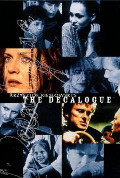
Poland 1988
Directed by
Krzysztof Kieslowski
571 minutes
Rated M
Reviewed by
Bernard Hemingway

The Decalogue
Krzysztof Kieslowski was a prominent name in European art cinema during the late 80s and early 90s (he died of AIDS-related complications in 1996). His last work, his Three Colours trilogy (1994), received a glowing critical reception but I confess that I have never felt compelled to agree with the adulation. Why, I am not sure. but I suspect that it is because that his explorations of moral philosophical issues in narrative form, for all its appearance of profundity is ultimately episodic and rather superficial and have a didactically illustrative quality that keeps them from being dramatically effective. Dekalog, a suite of 10 films made for Polish television is probably the best demonstration of his strengths and weaknesses.
Basing a series on the Ten Commandments already gives one a head start in the race for artistic significance (unless as with The Ten, you're trying to be funny) but in fact there is only the loosest connection, between the films and the Christian edicts, often no more than common subject matter.
The series was intended as a project to give young Polish directors their first opportunity at film-making however once written, Kieslowski decided that he would direct all ten, completing the entire series in under a year, using largely the same creative team. Dekalog 5 and 6 were released as feature films in 1988, titled A Short Film About Killing and A Short Film About Love respectively. Dekalog 5 is the most memorable of the series – a stark tale of senseless murder, whilst Dekalog 6, a story of a young woman’s conversion to love because of a boy’s ardour for her, for me at least, is probably its weakest, the only one of the episodes that feels contrived.
Whilst consistently well acted the core strength of the films inhere in their writing which is impressively economical. Developed by Kieslowski with his collaborator, Krzysztof Piesiewicz (who also co-authored Kieslowski The Double Life Of Veronique, 1991, and the Three Colours trilogy) the films impress as vignettes that capture the contradictions and dilemmae of everyday life without reducing them to simplistic morality plays.
Although there is a slight overlapping of characters and situations between the episodes there is no real narrative unity to the films and if anything their virtues are more apparent when viewed as stand alone works, with each viewer no doubt finding their own favourites amongst them.
DVD Extras: I’m So-So, a 55m documentary about the director.
Available from: Umbrella Entertainment
Want something different?





